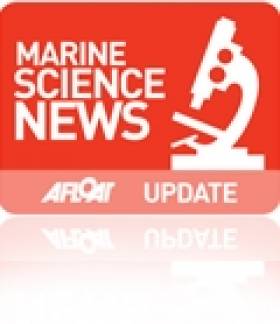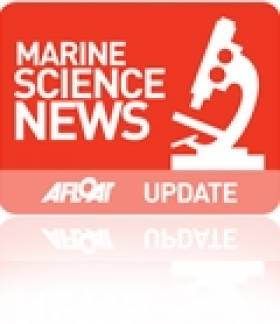Displaying items by tag: Secchi Disk
Get Involved With 'Secchi Disk' Global Plankton Survey
#MarineScience - The team behind one of the world's biggest studies of ocean plankton have renewed their drive to encourage participation by all manner of seafarers.
As reported earlier this year on Afloat.ie, the Secchi Disk project involves the use of an special apparatus, a 30cm-wide flat white disk attached to a tape measure or rope and weighted by a small weight that's dropped off the side of a vessel.
Mariners then observe the disk as it drops, and when it disappears from view that level is known as the Secci Depth, a measure of the turbidity of the water - which in turn is influenced by the amount of microscopic marine wildlife present.
Seafarers in British and Irish waters - sailors, fishermen and yachtsmen alike - can then contribute their measurements via the Secchi App for smartphones to help researchers build a more complete picture of phytoplankton activity in our oceans and measure their changes over time.
Full details of the project and how to take part are available via the Plymouth University website HERE.
Researchers Ask For Help In Global Plankton Survey
#MarineScience - Researchers at a UK university are hoping to enlist seafarers to help conduct one of the world's biggest studies of ocean plankton.
BBC News reports on the project by the Marine Institute at Plymouth University, which hopes to encourage fishermen and sailors alike to take part in its survey in Britain's coastal waters - including the Irish Sea - and far beyond.
Anyone participating in the study must drop off the side of their vessel an apparatus called a Secchi disk - a 30cm-wide flat white disk attached to a tape measure or a rope, and weighted from below by a small 200g weight.
When the disk disappears from view, that level is known as the Secchi Depth, which measures the turbidity of the water, which in turn is influenced by the amount of the microscopic marine wildlife in the water column.
Seafarers are being asked to record the Secchi Depth and upload to researchers via a mobile app for iOS and Android devices in order to build a complete picture of plankton activity in the world's oceans.
"If we can just get a small percentage of the global population of sailors involved, we can generate a database that will help us understand how life in the oceans is changing," said project leader Dr Richard Kirby.
"It would help us learn much more about these important organisms at a crucial time when their habitat is altering due to climate change."
BBC News has more on the story HERE.

























































